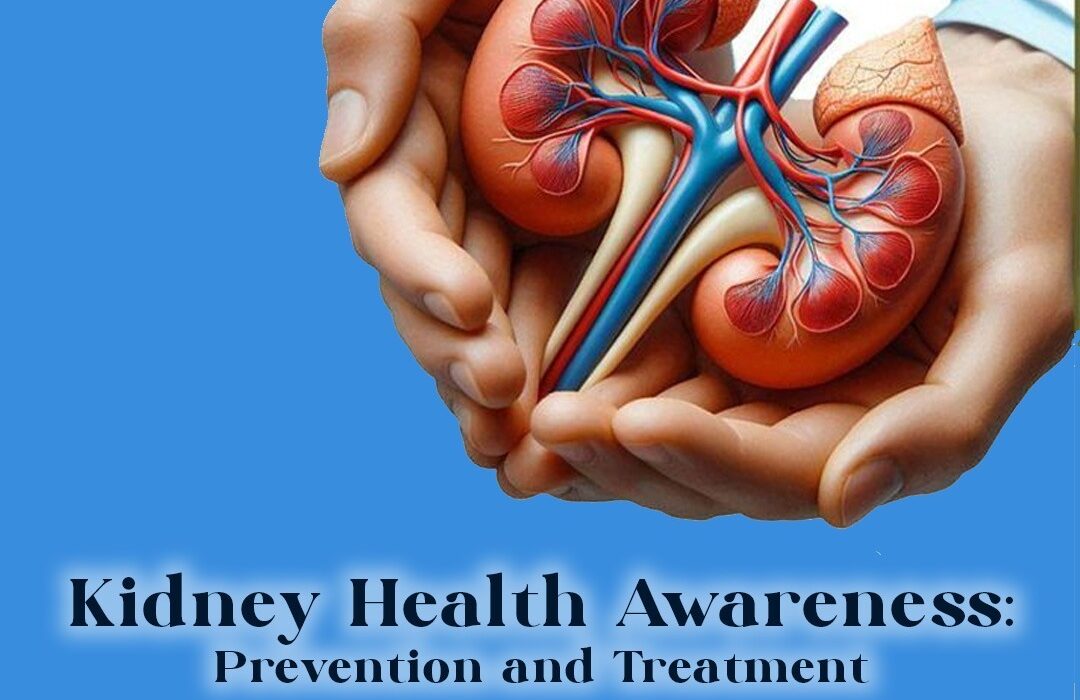In the intricate symphony of our bodies, our kidneys play a crucial, yet often underappreciated, role. These bean-shaped organs, each about the size of a fist, work tirelessly to filter our blood, remove waste, balance fluids, and regulate essential minerals. Yet, kidney health is frequently overlooked until problems arise. This blog post aims to shine a spotlight on kidney health awareness, offering insights into prevention and treatment strategies to keep these vital organs in top shape.
Why Kidney Health Matters:
Kidneys are indispensable to our overall health. When they’re not functioning properly, it can lead to a cascade of health issues, including hypertension (high blood pressure), electrolyte imbalances, and the buildup of waste products in the blood. Chronic Kidney Disease (CKD) is a condition characterized by the gradual loss of kidney function over time and affects millions worldwide. Understanding how to prevent kidney disease and how to manage it if it develops is crucial for maintaining overall health.
Prevention: Keeping Kidneys Healthy:
Preventing kidney disease starts with adopting a healthy lifestyle. Here are some key strategies:
- Stay Hydrated:
Water is essential for kidney health. It helps to flush out toxins and maintain the balance of bodily fluids. Aim to drink at least eight 8-ounce glasses of water a day, adjusting for factors like climate, exercise, and pregnancy.
- Eat a Balanced Diet:
A diet rich in fruits, vegetables, and whole grains can help maintain kidney health. Limit your intake of salt, sugar, and unhealthy fats. Foods high in antioxidants, like berries, apples, and leafy greens, can help protect your kidneys.
- Maintain a Healthy Weight:
Obesity is a risk factor for various kidney problems. By maintaining a healthy weight through diet and exercise, you can reduce your risk of developing kidney disease.
- Control Blood Sugar and Blood Pressure:
Diabetes and high blood pressure are leading causes of kidney disease. Regular check-ups, proper medication, and lifestyle changes can help manage these conditions.
- Avoid Smoking and Limit Alcohol:
Smoking can damage blood vessels, reducing blood flow to the kidneys. Limiting alcohol consumption can also help protect kidney health.
- Regular Check-ups:
Regular health screenings can detect kidney problems early, allowing for more effective treatment.
Prioritizing Patient Safety: Tips and Guidelines for Care
Treatment: Managing Kidney Disease
If kidney disease is diagnosed, the focus shifts to slowing its progression and managing symptoms. Treatment strategies include:
- Medication:
Depending on the cause and stage of kidney disease, medications may be prescribed to manage symptoms, reduce complications, and slow disease progression.
- Lifestyle Modifications:
Adopting a kidney-friendly diet, low in sodium, potassium, and phosphorus, can ease the workload on your kidneys. Regular exercise and quitting smoking are also beneficial.
- Dialysis:
For advanced kidney disease, dialysis may be necessary to filter and purify the blood mechanically. There are two main types of dialysis: hemodialysis and peritoneal dialysis.
- Kidney Transplant:
In severe cases, a kidney transplant may be the best option. This involves surgically placing a healthy kidney from a donor into your body.
Patient Safety First: Elevating Healthcare Standards for a Safer Tomorrow
Conclusion:
Our kidneys are remarkable organs, quietly performing critical functions that keep us healthy. By prioritizing kidney health through preventive measures and seeking timely treatment when needed, we can reduce the risk of kidney disease and enjoy a better quality of life. Remember, small steps towards a healthier lifestyle can have a big impact on your kidney health. Stay informed, stay proactive, and keep those kidneys happy!






